From the perspective of ETH price and market sentiment, 2024 is going to be a challenging year.
Written by: Christine Kim, Vice President of Research at Galaxy Digital
Translated by: xiaozou, Jinse Finance
What is Ethereum? Ethereum is the most decentralized, valuable, and mature general-purpose blockchain in the world. While Ethereum is fundamentally a technology, this year's Ethereum developer conference, Devcon, emphasized Ethereum as a concept, focusing on how the principles and values driving the development of the Ethereum protocol have changed over the years.
1. A Tough Year for Ethereum
From the perspective of ETH price and market sentiment, 2024 is going to be a challenging year.
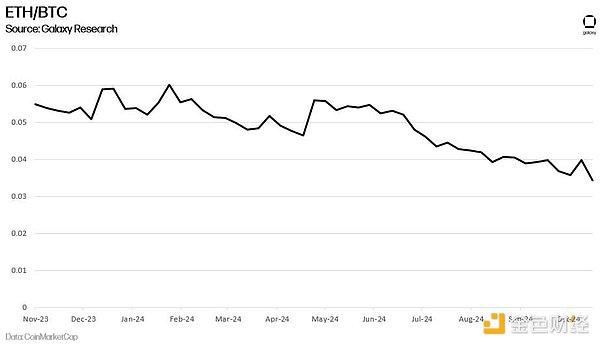
Many critics of Ethereum believe that over time, the decentralization, trusted neutrality, and anti-censorship cypherpunk values of the Ethereum community have declined or even been completely abandoned. Even within the Ethereum community, disagreements over values have sparked debates during the Pectra upgrade decision-making process and led to heated discussions on topics such as blob fee markets and issuance on X.
Despite Devcon 7 showcasing a wealth of technological innovations and announcements, none provided the community with clear information regarding Ethereum's long-term value and narrative. So far, the most anticipated announcement shared by Ethereum Foundation researcher Justin Drake this week is the launch of Beam Chain, a radical proposal to fundamentally reform Ethereum's current consensus protocol, Beacon Chain.
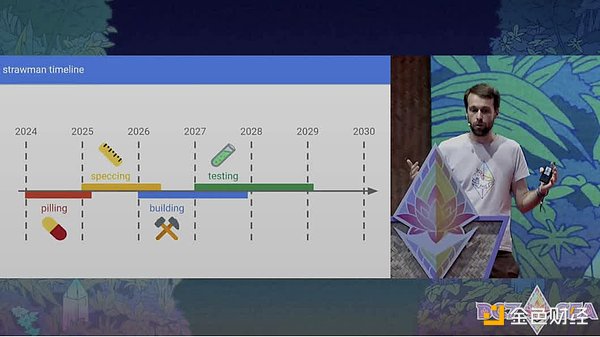
Although Drake detailed several new technical features aimed at enhancing Ethereum and L2 capabilities, the proposal lacks broad community support and fails to provide a "North Star" (a forward-looking goal) that excites stakeholders in a manner similar to the Ethereum Merge during its transition to proof of stake.
For years, the Merge has been Ethereum's North Star. It was a technological upgrade rooted in environmentalism and decentralization values that were nearly universally recognized by the community. Since the Ethereum Merge, no technological upgrade has aligned with Ethereum's values in a significant way, which in turn has led to confusion and disputes among Ethereum stakeholders about how Ethereum as a technology should develop.
2. What is Ethereum?
Aside from a series of technical announcements, the ideas presented at Devcon on how to build Ethereum and how to do so in a way that promotes decentralization and trusted neutrality greatly inspired the attendees. Although all speakers presented slightly different ideas about Ethereum, they shared a common fundamental belief that Ethereum aims to improve human welfare by creating permissionless, trust-minimized transparent systems.
If you have ever doubted the cypherpunk values of Ethereum inspiring innovation, the discussions at Devcon 7 emphasized that these values remain at the core of the Ethereum ethos. When asked about the trade-offs between decentralization and performance, all four members of the "Ethereum Values and Ethos Alignment" panel reiterated that the importance of decentralization should take precedence over performance and scalability.
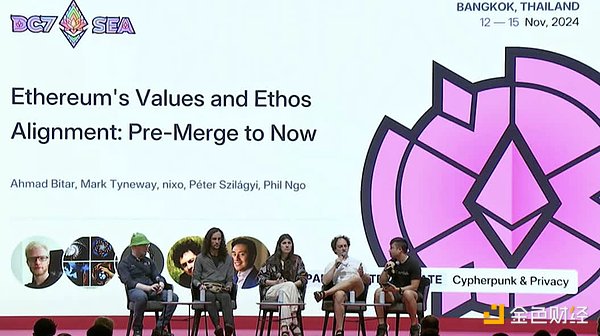
Philip Daian, co-founder of Flashbots, discussed the four characteristics of "Ethereum 3.0" in his keynote speech, which are non-negotiable. They include: permissionless, distributed, geo-economically decentralized, and truly neutral builders. Daian urged the Ethereum community to refocus on promoting and enhancing geographic diversity and permissionless design across all verticals of the Ethereum tech stack, rather than concentrating solely on other goals like improving user experience to drive mass adoption.
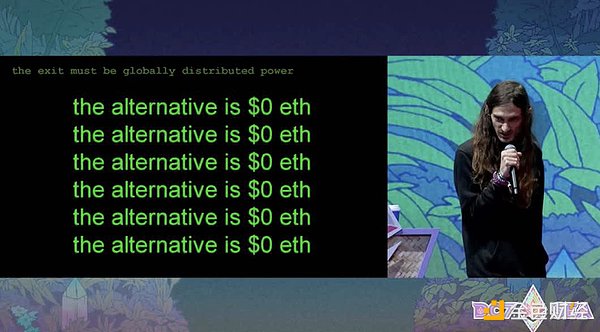
"The problem is, if you focus solely on user experience, that will be very bad. I think that's the reason for ETH's value going to zero. It will destroy the decentralized system we have carefully built, making us vulnerable to exploitation and reconstituting the systems we are trying to avoid," Daian stated in his keynote. Martin Koeppelmann, co-founder of Gnosis, introduced the concept of "native rollup" in his keynote, which is a rollup built following Ethereum values such as decentralization and trusted neutrality. Practically, for Koeppelmann, this means not using multi-signatures to control key rollup functions, deploying multiple rollup proof systems, and rigorously testing the rollup codebase (i.e., "having thousands of eyes review every line of code"), just like Ethereum.
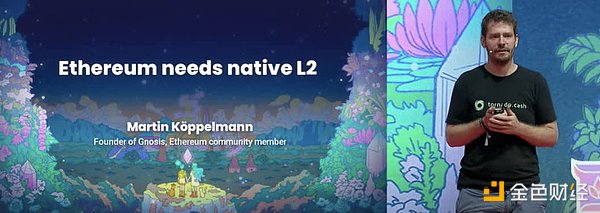
Finally, the entire day of Devcon programming was dedicated to exploring the concept of defensive acceleration or "d/acc." In the words of creator Vitalik Buterin, "d/acc is a concept, a set of technologies and protocols for building technology that makes human agency both the means and the end. Every technology we create should point towards the common freedom and happiness of humanity." Many Devcon attendees received a booklet on the d/acc concept as part of the conference swag, and on the last day of the conference, they also received a booklet on the future development of the Ethereum protocol, both written by Vitalik Buterin.
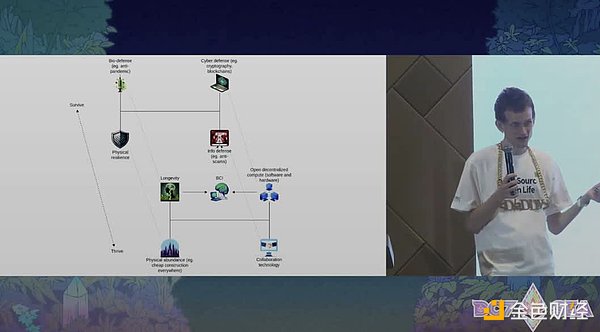
The manuals and programming from Devcon 7 emphasized a shared ethos among Ethereum developers rather than a shared technical roadmap. Compared to any innovations, upcoming upgrades, or development teams within the Ethereum ecosystem, the most striking "North Star" presented at the conference was the shared desire to establish permissionless, trust-minimized transparent systems for the improvement of human welfare.
免责声明:本文章仅代表作者个人观点,不代表本平台的立场和观点。本文章仅供信息分享,不构成对任何人的任何投资建议。用户与作者之间的任何争议,与本平台无关。如网页中刊载的文章或图片涉及侵权,请提供相关的权利证明和身份证明发送邮件到support@aicoin.com,本平台相关工作人员将会进行核查。



